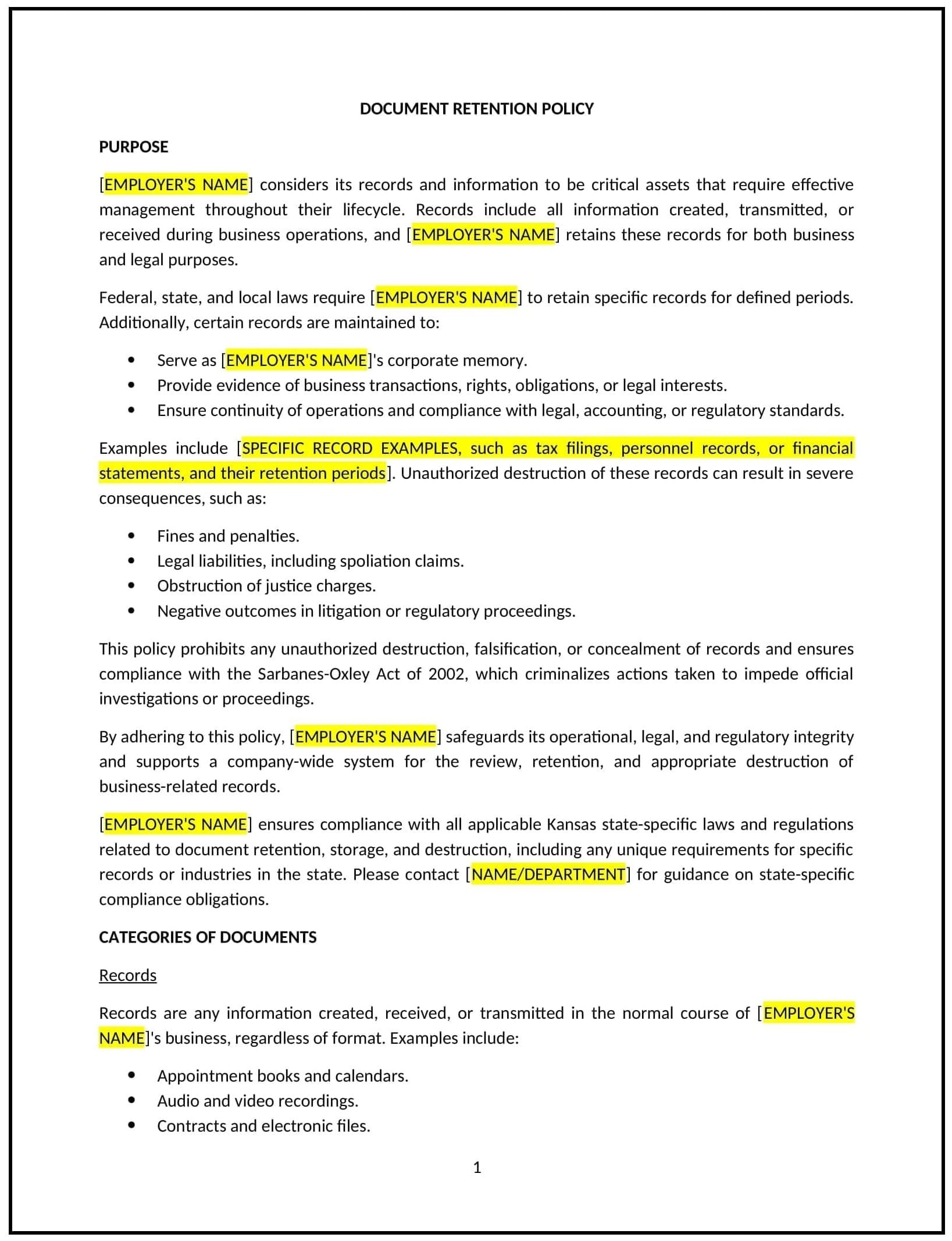Got contracts to review? While you're here for policies, let Cobrief make contract review effortless—start your free review now.

Customize this template for free
Document retention policy (Kansas)
A document retention policy helps Kansas businesses manage the lifecycle of business documents, including when to retain, store, and dispose of records. This policy outlines the types of documents that need to be preserved, the duration of retention, and secure disposal methods.
By implementing this policy, businesses can reduce the risk of legal exposure, improve record-keeping efficiency, and ensure that documents are accessible when needed for operational or legal purposes.
How to use this document retention policy (Kansas)
- Define document categories: Businesses should specify which types of documents need to be retained, such as financial records, contracts, employee files, tax documents, and emails.
- Establish retention periods: Businesses should determine how long each category of document should be retained based on legal, regulatory, or business requirements.
- Implement secure storage practices: Businesses should define how documents will be stored securely, whether digitally or physically, ensuring that confidential or sensitive information is protected.
- Set retention review procedures: Businesses should periodically review stored documents to determine if any can be safely destroyed or archived, following established retention periods.
- Outline disposal methods: Businesses should require that outdated or unnecessary documents be securely destroyed (e.g., shredding paper documents, securely deleting digital files).
- Provide employee training: Employees should be educated on the importance of document retention, the correct handling of documents, and how to follow the policy.
- Review and update regularly: Businesses should periodically assess the policy to ensure it remains up-to-date with changes in legal requirements or business practices.
Benefits of using a document retention policy (Kansas)
- Reduces legal risks: Proper retention and disposal of documents helps mitigate the risk of retaining unnecessary or outdated records that may be used against the business in litigation.
- Improves operational efficiency: By having clear guidelines for document management, businesses can quickly access important records when needed.
- Supports regulatory compliance: Businesses can avoid penalties by retaining documents for the required periods based on legal and regulatory requirements.
- Enhances data security: A structured approach to document storage and disposal helps protect sensitive or confidential information from unauthorized access.
- Reduces storage costs: By regularly reviewing and disposing of documents that are no longer needed, businesses can reduce physical or digital storage expenses.
- Promotes consistency: A clear document retention policy establishes consistent practices across the organization, making document management more straightforward.
Tips for using this document retention policy (Kansas)
- Clearly communicate retention periods: Businesses should ensure employees understand the duration for retaining each type of document.
- Implement secure storage practices: Businesses should use encrypted digital storage and locked cabinets for physical documents containing sensitive information.
- Review retention schedules annually: Businesses should regularly assess whether retention periods align with industry standards, legal requirements, or internal needs.
- Safeguard confidential information: Businesses should ensure that all sensitive or confidential documents are disposed of securely when their retention period expires.
- Keep track of documents in transit: Businesses should monitor documents that are transferred or archived to ensure proper handling.
- Ensure compliance with legal and industry standards: Businesses should stay informed about changes in laws and regulations that affect document retention and update the policy accordingly.